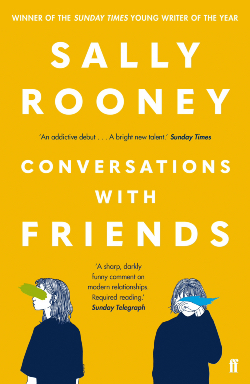
There are books destined to make you feel old if you read them after a certain age. Conversations With Friends was written by a 26 year old about a pair of 21 year olds. If you're over the age of, say, thirty, the young upstarts of this novel make a lot of dubious decisions — but really it's the fault of the thirty somethings who string them along.
Frances is a 21 year old spoken word artist and student in Dublin. When 38-year-old Melissa wants to write a profile of Frances and her creative partner (and ex-girlfriend) Bobbi, she introduces the pair to her husband, disappointed actor Nick. Conversations With Friends follows the back half of a year in the life of Frances and this group of friends whom the reader is never entirely sure she likes.
Sally Rooney was born in 1991, and many of her cultural touchstones are similar to those of someone born in 1985 — between these pages she touches on Ocarina of Time, Joanna Newsom, the "Top Banana†episode of Arrested Development — but her characters are young, naïve, and often act against their best interests in a way that is so alien that they may as well come from a different planet.
Frances is a cipher who has no strong feelings on anything one way or another, but she's the narrator that we are saddled with for the duration. Everyone she interacts with explicitly calls her out on a lack of personality, and she does nothing about it. In a way it's refreshing to read a novel in which the protagonist has good reason to beat themselves up, but it doesn't make for anything particularly edifying. Frances can identify the problems baked into her character, but the matter of fact way she refuses to address or rectify any of them makes much of Conversations With Friends an exercise in frustration.
Yet Frances can be forgiven; she's 21. The real problem with Conversations With Friends is that it renders Frances and Bobbi into tourists in the lives of more settled thirty somethings, who condescend to adopt them in less than savoury fashion. When young Irish people had the entirety of Europe at their disposal you couldn't entirely blame them for taking up their friends' offer of a week in the French countryside (presumably expenses paid, although Frances is at constant pains to point out that despite their bolshy leanings, everyone but her is stinking rich to the point of affectation). It's what Nick and, to a lesser extent, Melissa, do, and enable Frances and Bobbi to do, that should be examined. There's a power differential and a distinct flavour of exploitation that is never taken into consideration, as Conversations With Friends is never more than a face value novel.
Despite its name, Conversations With Friends contains no direct dialogue; those with a taste for quotation marks will find none. The way that Rooney relates speech is not quite on the level of "so I sez to Marthaâ€, but it is telling that the most conventionally presented communication is in the form of text messages, emails, and chat logs. Still, who sends as many emails as these people in the age of SMS, IM, and countless apps designed to facilitate not being email? Rooney makes a point about people not communicating directly, but her treatment exemplifies precisely what makes Conversations With Friends such a bitter reading experience: the disconnect is never bridged, and although this is not a novel with any pretensions towards "up litâ€, that does not mean it had to be a constant downer masquerading as a deep treatise.
Conversations With Friends is instructive, telling people in their twenties and thirties alike how not to conduct themselves. There are loathsome people in all corners of this book and, though Rooney paints with a realistic brush, it doesn't really make a reader want to spend any time with them. Readers in their twenties should not be afraid of having thirty plus year old friends; they should fear having friends like Nick and Melissa.
If you want a funhouse mirror reflection of the life of self-styled creatives, Conversations With Friends is a suitable project; despite its brief idyll in the French countryside, there's nothing but drear and unaddressed gloom from a self-absorbed but completely nihilistic narrator on display here.


